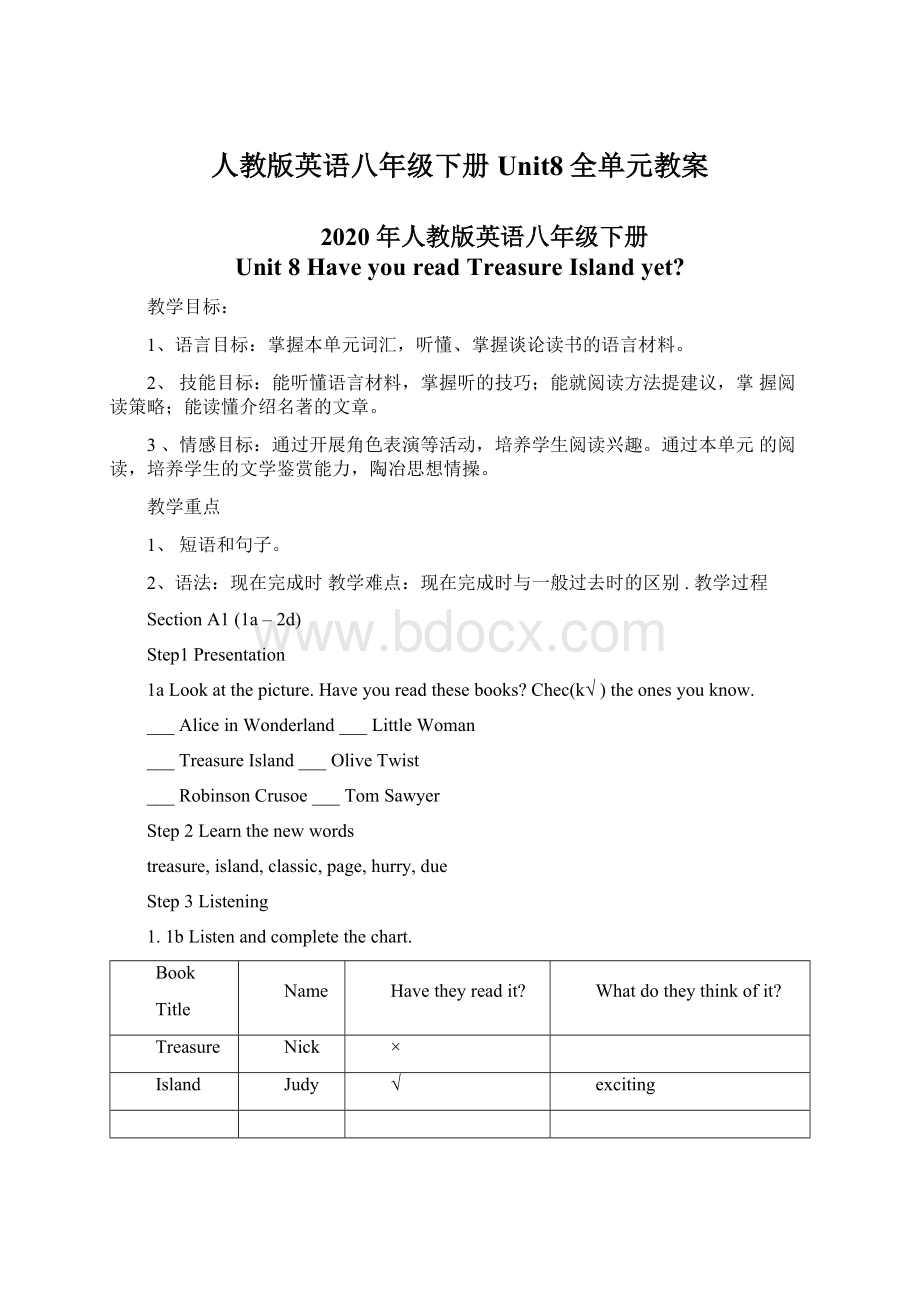人教版英语八年级下册Unit8全单元教案Word下载.docx
《人教版英语八年级下册Unit8全单元教案Word下载.docx》由会员分享,可在线阅读,更多相关《人教版英语八年级下册Unit8全单元教案Word下载.docx(16页珍藏版)》请在冰豆网上搜索。

×
Island
Judy
√
exciting
Robinson
Crusoe
Sandy
Alan
wonderful
Littlewomen
Kate
fantastic
Harry
Step4Speaking
1cPracticetheconversation.Thentalkabouttheotherbooksin1a.
Examples
A:
HaveyoureadLittleWomenyet?
B:
No,Ihaven'
t.Haveyou?
Yes,Ihavealreadyreadit.
What'
sitlike?
It'
sfantastic.
Step5Listening
2aListen.Whohasreadthesebooks?
Circlethenames.
1.TreasureIslandMark/Tina
2.OliveTwistMark/Tina
3.RobinsonCrusoeMark/Tina
4.TomSawyerMark/TinaKeys:
1.Tina2.MarkTina3.MarkTina4.Tina2bListenagain.WriteTfortrueandFforfalse.
1.OliverTwistisaboutaboywhogoesouttoseaandfindsanislandfulloftreasures.()
2.RobinsonCrusoeisaclassic.()
3.TinathinksthatTreasureIslandisafantasticbook.()
4.TomSawyerisaboutaboywholivesintheUnitedKingdom.()
Keys:
FTTF
Step6Speaking
2cUsetheinformationin2aand2btotalkaboutthebooks.
HasTinareadTreasureIsland?
Yes,shehas.Shethinksit'
sitabout?
sabout⋯.
2dRole–playtheconversation
Step7Languagepointsandsummary
Summary:
1、Phrases:
hearof,belike,goout,fullof,finishdoingsth.,beabout,growup,putdown,hurryup
2、Sentences:
HaveyoueverreadLittleWomenyet?
What'
sitlike?
OliverTwistisaboutaboywhogoesouttoseaandfindsanislandfulloftreasures.Steve,haveyoudecidedyetwhichbooktowriteaboutforEnglishclass?
Step8.Groupwork
2、GroupReportInourHe/Shethinks
1、Workingroup.
group,**thinks
doesn'
tthink
andhe/shedoesn'
t
think.⋯Ithink
butIdon'
tthink.
Teenagers,let'
sthoebreuyles!
Beahappyteenager!
Beapoliteteenager!
1.Ihearsomeofuslikereading(名著).
Step10Homework
Learnthenewwordsandexpressionsbyheart.
SectionA2(3a–3c)
Introducethemovie:
RobinsonCrusoe
ship,tool,gun,sand,else,cannibal,towards,land
Step3Reading
3aReadthepassageandanswerthefollowingquestions.
WhatdoesRobinsonCrusoewaitfor?
WhydoesRobinsonCrusoecallthemanFriday?
3bReadthepassageagain.Findwordsthathavethesemeanings.
1.Youcanusethesetoshootthings:
2.Somethingyouusetotravelinthesea:
3.Apieceoflandinthemiddleofthesea:
4.Youcanusethesetocutthings:
5.Signsleftbehindbysomeoneorsomething:
3cCorrectthesentences.
1.RobinsonCrusoearrivedontheislandwithenoughfoodanddrink.
2.Fridaymadeasmallboat.
3.Robinsonhadsomefoodandtoolswhenhefirstarrivedontheisland.
4.Robinsonusedtheshiptobuildahouse.
5.Fridaysawsomemarksofanothemran'
sfeetonthebeach.
6.Robinsontriedtokillthetwomen.
Step4Languagepoints
短语:
arriveonthisisland,makeaboat,bringback,giveup,waitfor,cutdown,buildahouse,kill⋯forfood,themarksofanotherman'
sfeet,whoelse,seesb.doingsth.,runtowards,helpsb.dosth.,namesb⋯.,teachsb.sth.
句子:
1.AlthoughIhavelosteverything,Ihavenotlostmylife.
虽然我失去了一切,但是没有失去生命。
although虽“然,尽管”,引导让步状语从句,不能与but连用。
e.g.Heisyoung,butheworkshard.他年龄小,但是工作很努力。
2.SoIwillnotgiveupandIwillwaitforanothership.因此我不放弃,要等候另一只船。
another既可用作形容词,也可用作代词。
用作形容词时,意思是“又一的;
再一的”,修饰名词,位于名词前;
用作代词时,意思是“另一个”。
e.g.Justatthattime,anothermancamein.Sayingisonethinganddoingisanother.
another还可以和数词连用,常放在数词的前面,意为“还;
再;
又”。
e.g.Weneedanotherthreemantohelpdothework.
3.Howlonghavetheybeenhere?
你来这儿多久了?
howlong常用于询问时间,意为“多久;
多长时间”,与现在完成时连用,要求谓语动词必须是延续性动词。
e.g.Howlonghaveyouhadthebook?
你买这本书多久了?
4.Notlongafterthat,Isawsomecannibalstryingtokilltwomenfromabrokenship.在那之后不久,我看见一些食人肉质在试图杀死两个来自破船上的人。
seesb.doingsth意.为“看到某人正在做某事”,强调看到的动作正在进行。
e.g.Marysawhimcleaningtheclassroom.玛丽看见他正在打扫教室。
seesb.dosth.意为“看到某人做了某事”,强调看到动作的全过程。
e.g.Marysawhimcleantheclassroom.玛丽看见他打扫教室了。
【运用】将下列汉语句子与英文翻译相匹配。
()①昨天我看见她正在花园里干活。
()②昨天我看见她在花园里干活了。
A.Isawherworkinthegardenyesterday.
B.Isawherworkinginthegardenyesterday.
5.Oneofthemdied,buttheotherrantowardsmyhouse.他们当中一个人死了,但是另一个朝我的房子跑来。
runtowards朝⋯⋯跑
e.g.Herantowardsthestation.他跑着去火车站。
6.InamedhimFridaybecausethatwasthedayImethim.我管他叫Friday因为那是我遇见他的那一天。
name作动词,意为“命名;
给⋯⋯取名”。
固定搭配“name+sb.+名字”意为“给某人取名为⋯⋯”。
e.g.LucynamedherlittlesonDavid.露西给她的小儿子取名为戴维。
Step5Homework
1.Learnthenewwordsandexpressionsbyheart.
2.RetellthestoryofRobinsonCrusoe.
SectionA3(GrammarFocus4a-4c)
Step1Warmup
Readthefollowingsentenceswehaveseen.
HaveyoureadLittleWomenyet?
Yes,Ihave./No,Ihaven'
t.
HasTinareadTreasureIslandyet?
Yes,shehas.Shethinkssitfantastic'
.
Haveyoudecidedwhichbooktowriteaboutyet?
Yes,Ihave.I'
vealreadyfinishedreadingit.Itwasreallygood.
Step2现在完成时
用法
1.表示过去发生或已经完成的某一动作对现在造成的影响或结果
e.g.–Haveyouhadyourlunchyet?
–Yes,Ihave.I'
vejust现ha在d我it.不(饿了。
)
2.表示动作或状态从过去某一时刻开始,一直延续到现在,而且可能还要继续下去。
e.g.Ihaven'
tseenherthesedays.
I'
veknownBobforthreeyears.
veebneatthisschoolforovertwoyears.
时间状语
already,yet,just,ever,never,before
构成
现在完成时是由“助动词have/has+动词的过去分词”构成的,规则动词的过去分词构成与过去式相同,不规则动词的过去分词则需逐个记忆。
动词的过去式的变化和过去分词的变化并不完全相同。
我们对它们作了一个大致的分类。
(注:
例子中单词的变化顺序为:
动词原形→动词的过去式→动词的过去分词)
一、过去式和过去分词的变化相同
规则变化:
1.一般在动词词尾直接加ed。
如:
pick→picked→picked;
wish→wished→wished;
stay→stayed→stayed
2.以不发音的e结尾的动词后面加d。
like→liked→liked;
hope→hoped→hoped;
phone→phoned→phoned
3.以“辅音字母+y”结尾的动词,变y为i,再加-ed。
study→studied→studied;
hurry→hurried→hurried;
reply→replied→replied
4.词尾只有一个辅音字母的重读闭音节动词,要双写辅音字母,再加-ed。
stop→stopped→stopped;
clap→clapped→clapped不规则变化:
5.以不变应万变。
let→let→let;
put→put→put;
read→read→read
6.若中间有双写e,则去掉一个e,单词末尾再加t。
feel→felt→felt;
keep→kept→kept;
sleep→slept→slept
7.结尾的字母d变t。
lend→lent→lent;
build→built→built;
send→sent→sent
8.变为以-ought或-aught结尾。
buy→bought→bought;
bring→brought→brought;
catch→caught→caught;
teach→taught→taught句式
1.肯定句:
主语+have/has+过去分词(+其他)
2.否定句:
主语+have/has+not+过去分词(+其他)
3.一般疑问句:
have/has+主语+过去分词(+其他)
4.特殊疑问句:
1)特殊疑问词(不是句子主语)+have/has+主语+过去分词(+其他)
2)特殊疑问词(是句子主语)+have/has+过去分词(+其他)already和yet都可以作为现在完成时的标志词,但它们的用法不同。
◆already一般用于肯定句中。
Wehavealreadycleanedupourclassroom.
注意:
already用于疑问句中时通常表示惊奇。
Haveyoufinishedyourhomeworkalready?
Ican'
tbelieveit.
◆yet一般用于疑问句和否定句中。
Haveyouseenheryet?
Thebushasn'
tcomeyet.活学活用
Writetheformsofthepasttenseandpastparticiple:
drink
see
find
leave
tell
—WhyisMr.Yangstillintheteachers'
office?
—Maybehehisworkyet.
A.doesn'
tfinishB.hasn'
tfinished
C.haven'
Step3Exercises
1.Finish4aandchecktheanswers.
Ihavejustdrunksometea.
Haveyoufoundit?
Hehasalreadyleft.
didheleave
Shehasalreadyseenthefilmhaven'
ttoldthemyet
2.Finish4bandchecktheanswers.
loves,hasread,willbe,finished,willwrite,hasn'
retad
3.Finish4candchecktheanswers.
Makeconversationsandcompletethechart.(Followtheconversationonpage60)Step4中考链接
()
【2013广西贵港】
—DoyouknowthemovieLostinThailand?
—Yes.Iittwice.It'
sfunny.
A.sawB.seeC.haveseenD.willsee
【2013黑龙江牡丹江】
—Lunch?
—No,thanks.I.
A.willeatB.ameatingC.haveeaten
【2013湖北黄冈】
—WhereisTom?
Wecan'
tfindhimanywhere.
—Perhapshehome.
A.hascomeB.isgoing
C.wentD.wasgoing
CCA
SectionB1(1a-2e)
Step1Warmingup
Showsomepicturesaboutsingersandmusicians.Askandanswer:
Whoisyourfavoritesingerormusician?
Whydoyoulikehimorher?
Step2Newwords
Learnthenewwords:
pop,rock,band
1bListentoaconversationbetweenAlexandDave.WriteAforAlexandDforDavenexttoeachopinion.
TheTomsmustbepopular.
TheTomsplaypopmusic.
TheToms'
musicsoundsmorelikerock.
ListeningtoTheTomsisagoodwaytowakeup.
1cListenagain.Takenotes.
Bandname
Country
Numberofpeopleintheband
Kindofmusic
WhyAlexandDaveliketolistentothis
Alex:
band
Dave:
1dAskyourfriendsandparentswhatkindofmusictheylistentoandwhy.Howdoesthemusicmakethemfeel?
Makeaconversationlike:
A:
Whatkindofmusicdoyoulistento?
Ilistentopopmusic.
Whydoyoulistentoit?
Ilikeit.
Howdoesthemusicmakethemfeel?
Itmakesmerelaxed.
Step5Newwords
1.fann.迷;
狂热爱好者
2.laughtern.笑;
笑声
3.beautyn.美;
美丽
4.recordn.唱片;
记录v.录制;
录(音)
e.g.Themachineisrecordingnow.v(.)那个机器正在录音。
5.foreveradv.永远;
不断地
e.g.Thelittleboyisforeveraskingquestions.这小男孩老是没完没了的问问题。
6.abroadadv.在国外,到国外go\studyabroad
e.g.Areyougoingabroadforyourholiday?
你打算去国外度假吗?
7.actuallyadv.真实地